CACT E-STUDIO
Christina Calbari was born in 1975 in Athens, where she resides and works.
Drawing with charcoal, pencil, chalk and watercolor and archival photographs with drawing interventions are the mediums that she engages with.
She started using photography in 2000 with works in which the concealment of the body and face through objects is basic and characteristic. She continued to photograph hidden women’s bodies throughout 2002 while from 2005 till today drawing prevails with emphasis on the children’s world and especially that of little girls. All sorts of distortion and the hiding of the characteristics are becoming her trademark in her drawings but also in her “painted” photographs.
With an overtly surreal tone, overstressing elements, and with creepy actions and details, like scenes from a thriller movie, she describes the children’s world and the child psychology as a series of nightmares and tortures, sometimes descriptively and other times simpler. A world which is as private as a home or a child’s room and as public as a school. In many cases the absence of an adult figure is so intense, but when he exists, he’s only there to transmit its own psychopathology to the child and thus torment it.
Her new work, like the series Game Traps (2010), is basically moving to the same direction as her previous work, except that here colour is dominant. Children’s games -“girly” games- are transformed into tormenting endless procedures whilst for once more the imaginary and the surreal take over.
The also new series Unfolding Absence (2010) consists of old black and white photographs of girls (women?) in some private boarding school or institution that are playing, reading, walking in the countryside, and photographs of maids cleaning houses. In these images the artist has intervened constructing black formations, which either hide the faces of the women or are presented as some kind of guinea pigs to experiment on.
In the overall of her visual creation, Calbari reconstructs or creates from the beginning disturbing images of violence, psychological and physical, a violence that is exercised upon children either from other children, through seemingly innocent group games, or from adult authority figures. Her works usually look like images the way an adult would have seen and interpreted them, through the pathology of modern society, having already abstracted every bit of innocence and purity from his mind and experience.
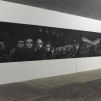
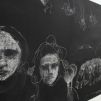
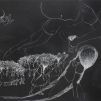

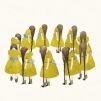
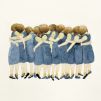
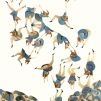
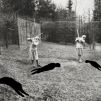

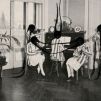
Statement
A few words for my work
The purpose of my work is to express my deepest anxieties and to give life to my most intimate fears. The irrationality of the human condition and the fear of death are the main existential themes that preoccupy me and those that I try to verge on mainly through recalling childhood memory.
Therefore childhood is a reference point for my iconography. I concentrate on the dark side of it and especially on its violent, either direct or covert manifestations. The child when coming face to face with the adult authoritative world usually ends up in breach with itself due to its innocence and ignorance. The child is inevitably trapped in a whole of systems – parental, educational, religious, and social – and is also manipulated through a context control, discipline, rules and threats that mirror upon it the pathogenesis of the society that it lives in.
This physical, mental and psychological violence, sometimes conscious and other times unintentional, that usually weights down children with complex and mimetic behaviors, is for me my field of interest. The images I create pursue to imprint this exact dark side of the Ego in a tender but also cruel universe.
The means that I use to imprint these images are mainly drawing and photography. My work is developed into sections/themes in which every time I experiment with different searches concerning the aforementioned medium. My ultimate goal though and the connecting link between these themes is always the same; the creation of “psychological” images that will represent metaphorically the anxiety of the human existence.
Christina Calbari


